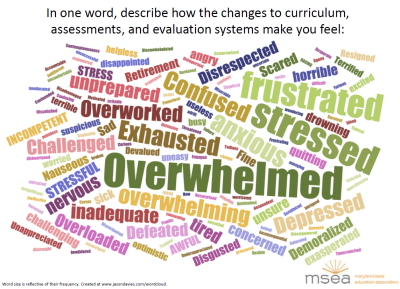
Word cloud from the results of a survey of teachers by the the Maryland State Education Association.
State legislatures will double their efforts this year to change, slow down or outright repeal Common Core, the new standards-based education curriculum that 45 states and the District of Columbia began adopting in 2010.
Several bills working their way through the Maryland General Assembly this session are part of this trend.
In 2013 and in 2012, 20% of Common Core related bills in other states sought to change the controversial curriculum. This year that number will rise to 40%, said Daniel Thatcher, an education analyst with the National Conference of State Legislatures (NASC) who is studying the issue.
Thatcher said the number of Common Core bills introduced in statehouses across the nation increased from a modest 42 in 2011 to what will likely be over 400 in 2014. This year, 233 bills have been introduced and another 100 have yet to be entered.
Bills seek to change state education department decisions
Thatcher created a website that follows Common Core legislation on the state level. A category he established, “redress legislation,” identifies bills that are critical about the way state departments of education are currently implementing Common Core.
Common Core State Standards LogoBills identified as redress bills include a wide variety of measures, from delaying the use of test scores aligned with Common Core to stopping its implementation altogether.
“This year it appears there is an aberration,” said Thatcher. ”Forty percent of legislation [about Common Core] are redress bills.”
“I want to stress that a lot of times the intent isn’t to get rid of or repeal the Common Core,” Thatcher said. “It can be as simple as a concern about using [student] assessment data for teacher evaluation purposes without having a few more years of data to substantiate the validity of the assessment.”
Common Core is a standards-based education curriculum with an end goal to have students “college and career ready” by high school graduation. The standards are part of President Obama’s Race to the Top education initiative that awarded $4.3 billion of federal stimulus funds to states that adopted it.
Maryland efforts include changing name, implementing delay in using student test data
“Maryland is a good example of how things are playing out nationally,” Thatcher said.
The Maryland legislature is expected to pass bills this year that will delay using student testing data for teacher evaluation purposes until the 2016-2017 school year. Another bill will ensure legislative review before the state department of education requests federal education waivers, and another bill would create a workgroup designed to oversee the implementation of Common Core.
All these bills have now passed the House of Delegates, and the last two are awaiting action in the Senate Committee.
Maryland now refers to its state education curriculum as the Maryland College and Career Ready Standards.
Across the U.S., some of the redress proposals would:
-- Allow local districts or schools to opt out of “college and career ready standards” (CCRS) or CCRS-aligned assessments;
-- Amend the state’s administrative procedure act and/or academic standards adoption procedures;
-- Delay implementation;
-- Provide a formal state-led review;
-- Preclude spending on CCRS-related implementation activities; or
-- Withdraw the state from participating in a Common Core-aligned assessment consortium.
Lawmakers also consider funding requests
Funding requests to set up infrastructure systems needed for the Common Core technology based tests were also prominent.
Local school systems in Maryland have estimated needing $100 million to get their schools ready to implement the computerized tests next year.
So far, of the states who have joined, Indiana is the only state to have officially withdrawn from Common Core.
Other states have issued executive orders vowing to keep the federal government out of state and local education decisions. Some have tried rebranding Common Core to distance themselves from the negative stigma that can sometimes be associated with it.


